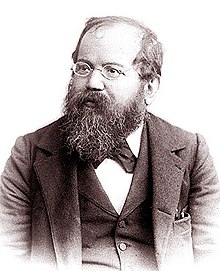
Back ويليام شتاينيتز Arabic ويليام شتاينيتز ARZ Vilhelm Steynits AZ Вильгельм Стейниц BA Вільгельм Стэйніц BE Вільгельм Стэйніц BE-X-OLD Вилхелм Щайниц Bulgarian Wilhelm Steinitz BR Wilhelm Steinitz BS Wilhelm Steinitz Catalan
Wilhelm Steinitz | |
|---|---|
 | |
| Country | Austrian Empire → Austria-Hungary United States |
| Born | May 14, 1836 Prague, Kingdom of Bohemia, Austrian Empire |
| Died | August 12, 1900 (aged 64) New York City, United States |
| World Champion | 1886–1894 |
William Steinitz (born Wilhelm Steinitz; May 14, 1836 – August 12, 1900) was a Bohemian-Austrian, and later American, chess player. From 1886 to 1894, he was the first World Chess Champion. He was also a highly influential writer and chess theoretician.
When discussing chess history from the 1850s onwards, commentators have debated whether Steinitz could be effectively considered the champion from an earlier time, perhaps as early as 1866. Steinitz lost his title to Emanuel Lasker in 1894, and lost a rematch in 1896–97.
Statistical rating systems give Steinitz a rather low ranking among world champions, mainly because he took several long breaks from competitive play. However, an analysis based on one of these rating systems shows that he was one of the most dominant players in the history of the game. Steinitz was unbeaten in match play for 32 years, from 1862 to 1894.
Although Steinitz became "world number one" by winning in the all-out attacking style that was common in the 1860s, he unveiled in 1873 a new positional style of play, and demonstrated that it was superior to the previous style. His new style was controversial and some even branded it as "cowardly", but many of Steinitz's games showed that it could also set up attacks as ferocious as those of the old school.
Steinitz was also a prolific writer on chess, and defended his new ideas vigorously. The debate was so bitter and sometimes abusive that it became known as the "Ink War". By the early 1890s, Steinitz's approach was widely accepted, and the next generation of top players acknowledged their debt to him, most notably his successor as world champion, Emanuel Lasker.
Traditional accounts of Steinitz's character depict him as ill-tempered and aggressive, but more recent research shows that he had long and friendly relationships with some players and chess organizations. Most notably from 1888 to 1889 he co-operated with the American Chess Congress in a project to define rules governing the conduct of future world championships. Steinitz was unskilled at managing money, and lived in poverty all his life.